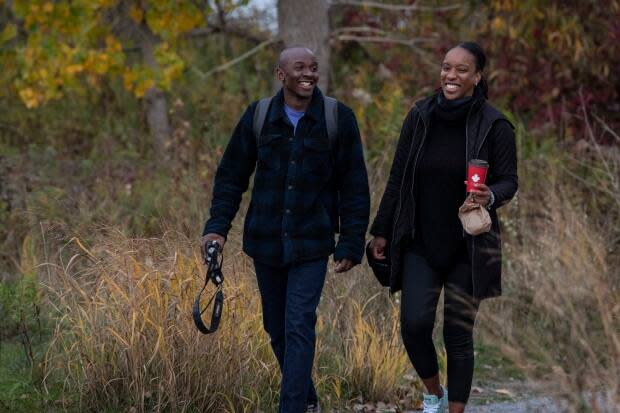This BIPOC birding group started in London, England. It's now taken flight in Toronto

On a fall afternoon in Tommy Thompson Park on Toronto's waterfront, Moira Kaviziya says she felt a sense of "internal bliss" as she went bird watching along with a group of Black people and others of colour.
"I do not know much about the birds but I do love the symbolism behind it. Birds represent freedom,"Kaviziya said.
The group, led by Kazeem Kuteyi, is called Flock Together and it's an offshoot of an initiative based in London, England that aims to get Black, Indigenous and other people of colour (BIPOC) interested in bird watching and being out in nature.
The movement got started amid Black Lives Matter protests this summer and grew as COVID-19 restrictions eased.
"The walks also double as space for healing and act as a mental health support network for members of the flock," Kuteyi told CBC Toronto. And that is a big help, Kaviziya says.
"There's that freedom to disclose, like, things that we feel uncomfortable of, or what we've been going through," she said.
Flock Together's founders, Ollie Olanipekun and Nadeem Perera, say they're trying to reverse the under-representation of people of colour in the natural world, a goal that several other groups and people are also focused on in Toronto.

For Kaviziya, who says she has has trouble meeting new people, this day out with other birders allowed her to express and share similar life experiences.
For his part, Emmanuel Adarkwah could not put his camera down. He says the outing was a much needed getaway.
"I feel calm. I do not know if it is the waves or the wind, I feel so calm," he told CBC News.
WATCH| How a new birding group in Toronto is bringing more people of colour into the natural world:
For Lillian Meshki, connecting with people in the group has helped her deal with loneliness.
"For so long, I felt very alone and not being able to express myself or feeling unheard or misunderstood," she said. "Connecting with people who are also feeling the same ... helps a lot, just by being able to express yourself and sharing similar struggles."
Birding not just for white people, founder says
Perera, who spoke to CBC News Friday via Google Meet from London, says he and Olanipekun founded the group partly to put to rest the idea that birdwatching is an activity limited to white people.
"That's, like, one of our primary focuses, but we also have ecological benefits to be had from the group by way of recording bird species, collaborating with already established conservationists within the natural world," he said.
"There are also many mental health benefits to be had from exposing oneself to nature, identifying with the natural system as opposed to this constructed societal system, as well as just being an amazing day out for a Sunday."
Perara also says the project aims to make nature totally accessible.
"The barrier to entry for nature is so low, but for some reason people still think it's not for them," he said.
"So, we just want to open everybody's eyes and open that door and bridge that gap between people living in the city, underprivileged people and nature."
Perara says the idea started with just two people but it will see a global expansion and go beyond being a support group.

"The goal is to work within communities on the ground level. We have huge plans to expand our international chapters," he said.
"We are working very hard to work within schools to encourage more young people to take an interest in nature," he added.
"We want to work with support groups also to tackle the mental health that comes with living ... in the hustle and bustle of the city."
For more stories about the experiences of Black Canadians — from anti-Black racism to success stories within the Black community — check out Being Black in Canada, a CBC project Black Canadians can be proud of.



